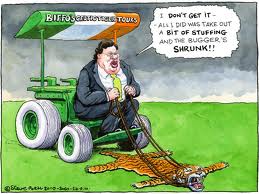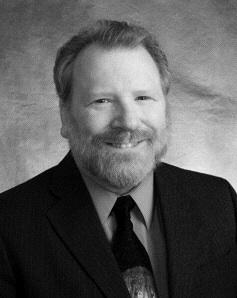(Cross-posted with Benzinga)
This is the second in a series of articles about the ECB/EU/Euro crisis. Ireland is not like Greece. It ran a budgetary surplus during its boom. It privatized and reduced work restrictions. Its budgetary crisis would be serious because it suffered from one of the worst bubbles (relative to GDP) in history and it lacks a sovereign currency. Ireland’s budgetary crisis is crushing because its political leadership, gratuitously, decided that a nation of four million people should bail out the creditors of Irish banks even though it had no legal or moral obligation to do so and was incapable of doing so. The Irish banks’ creditors were primarily foreign, particularly foreign banks. Absent the Ireland’s failed and quixotic attempt to bail out the German banks Ireland would not be in a sovereign debt crisis.
Ireland, along with Iceland, became the Cato Institute’s Exhibits A&B for the purported success of deregulation and desupervision. European Central Bank President Trichet shared the Cato Institute’s praise for Ireland’s policies, but he came to Ireland on May 31, 2004 to make another claim – the “Celtic Tiger” proved the triumph of Ricardo over the errors of Keynes. Trichet made clear that he was an anti-regulatory supply-sider.
Structural reforms and growth, as highlighted by the Irish case
Keynote address by Jean-Claude Trichet,
President of the European Central Bank,
delivered at the Whitaker lecture organised by the Central Bank and Financial Services Authority of Ireland,
Dublin, 31 May 2004.
Trichet began his address in the traditional fashion of any polite guest – he sought to find something in common with the audience and he praised them.
“Speaking about Ireland’s EU Presidency, and noting that the outgoing President of the European Parliament, Pat Cox, is also Irish, I cannot resist mentioning with pride my own Celtic roots as a native “Breton”!”
“[T]the process of transformation that [Ireland] began over four decades ago has become a model for the millions of new citizens of the European Union. The new Member States of the EU have had to confront economic challenges whose magnitude and long-term importance are similar to those that faced Ireland when you began your work. Thanks to Ireland’s economic success, to which you devoted your life, we can be confident that economic reform works.”
Trichet cited Ireland as his definitive proof of the correctness of the two main point of his talk. The substance of these points is a staple of the stump speech of every Republican candidate for the presidency in the U.S. The first priority is to deregulate.
“[O]one has to consider the astonishing experience of Ireland, which recovered from poor economic and fiscal conditions in the mid-1980s to an impressive pace of economic activity and sound fiscal position in no more than a decade. In addition to a favourable macroeconomic environment and the benefits derived from participation in the European Union, the economic recovery was grounded on far-reaching home made structural reforms in the labour, capital and product markets.”
The second priority is to cut government spending. Ireland has done both and is the Celtic Tiger because it has followed both policies.
“In this respect, the dramatic acceleration of output in Ireland in the post 1987 period can be associated with a vigorous and successful project of fiscal consolidation starting in 1987. This programme was based on tight expenditure control via subsidy cuts, social security reform and a streamlining of the public sector and control of public expenditure.
Ireland’s experience … clearly shows how policies geared to fiscal consolidation do not necessarily entail contractionary effects on real aggregate demand and economic activity. [I]in spite of the tightening policies undertaken, the rate of growth showed a significant increase in relation to previous years. [S]ignificant budget consolidation based on spending reduction enhanced the long term fiscal sustainability and increased the policy credibility of a more favourable tax regime.
Regarding Ireland, the budget deficit was reduced from 10.1 % of GDP in 1986 to 1.7 % in 1989, while the debt ratio declined from 113 % of GDP to 100.4 % of GDP; over the same period GDP growth accelerated from 0.3 % to 6.2 %; the overall consolidation effort, as measured through the structural fiscal balance, amounted to 5.1% of GDP over these three years. In the years afterwards, Ireland continued to enjoy high rates of GDP growth and kept large structural fiscal surpluses (almost always above 5 % of GDP), thus allowing for a steady and rapid decline of the debt ratio (which reached 32.4 % of GDP in 2003).
The Irish and Danish experience brings evidence that expansionary expectation effects may dominate on the contractionary effects of a fiscal consolidation. In both cases there is a considerable evidence that the consumer boom was prompted by the wealth effects of cuts in public spending, as a signal of lower future taxes, concomitantly to the wealth effects implied by the fall in interest rates. On the supply side, a low tax environment has underpinned the pick up in economic activity in Ireland.”
His substantive introduction was that all was mostly well. “Economic and Monetary Union has been highly successful in fostering macroeconomic stability in Europe.” The euro and financial integration were unambiguously stabilizing.
“Finally much progress has been achieved in capital market reforms, not least due to the introduction of the euro. But the further integration of national capital markets towards a truly European financial market could make an even more important contribution to safeguarding against country-specific shocks. It would also result in greater availability of risk capital – particularly for innovative enterprises – and, more generally, in a reduction in financing costs for productive investments. Structural reforms in capital markets should aim to allow a more effective allocation of savings toward the most rewarding investment opportunities. Further efforts should also be made to promote foreign investment in the euro area in order to attract additional capital and promote a greater transfer of technology.”
The EU Growth and Stability Pact prevented contagion within the EU: “fiscal discipline prevents spill-over effects from one country to another in the form of higher interest rates.”
Note that Trichet framed lower interest rates as unambiguously favorable – they would prompt greater productive investments. Freer capital flows would move investable funds to their most productive uses. Indeed, he repeated this point for emphasis:
“Beyond these economic underpinnings, other considerations are worth mentioning: a fiscal policy set according to rules adds to macroeconomic stability by providing agents with expectations of a predictable economic environment; this reduces uncertainty and promotes longer term decision making, notably investment decisions, and economic growth; in addition, sound fiscal policies contribute to lower risk premia on long term interest rates and thus support more favourable financing conditions….”
Regulation played no favorable role. Trichet only non-hostile reference to it was extremely vague: “Moreover, Ireland developed a transparent regulatory framework.” In reality, Ireland had an opaque, wholly ineffective anti-regulatory framework for financial regulation.
In addition to his ode to Ireland’s deregulation and financial miracle, Trichet provided an ode to the euro.
“Moving to the second topic of my speech, i.e. fiscal policies, let me stress that we Europeans have been very bold in creating a single currency in the absence of a political federation, a federal government and a federal budget at the euro area level. Some observers were indeed arguing that without a federal budget of some significance the policy mix would be very erratic, depending on the random behaviour of the different national fiscal policies of the member countries. They were also arguing that without a federal budget it would be impossible to weather, with the help of the fiscal channel, asymmetric shocks hitting one particular member economy. In this respect, the very existence of the Stability and Growth Pact actually allows to refute these two arguments: first, the Maastricht Treaty and the Pact provide a mutual surveillance by the “peers”- i.e the Ministers of Finance – of national fiscal policies; second, by calling upon Member States to maintain their budget close to balance or in surplus over the medium term, the Pact allows the automatic stabilisers to play in full in countries facing an economic downturn, without breaching the 3 % ceiling for the deficit.”
“Bold” is one word to describe creating the euro without creating the conditions vital for weaker EU members to escape simultaneously from a sovereign debt crisis and a severe recession. Other, blunter terms come to mind. Each of the safeguards he asserted has failed in this crisis.
But Trichet had a fallback position – cut taxes and the national deficits and cause a supply-side boom. He used the term “fiscal consolidation” as a euphemism for a wave of budget cuts, particularly in entitlements such as care for retirees.
“Some people argue that fiscal consolidation is detrimental to demand and economic activity. I would maintain that wealth and expectational effects of well-designed consolidation programmes might very much reduce and possibly even outweigh the traditional Keynesian multiplier effects of fiscal policy on demand and activity. If fiscal consolidation is perceived by the private sector as a credible sign that public spending will be permanently lower in future years, households will revise upwards their expected permanent income in anticipation of lower future taxes. Therefore, current and planned consumption will also increase.
In addition, fiscal consolidation might improve long-term financing conditions by way of less demand on the savings pool (reducing crowding out) and lower risk premia on government paper. Hence, wealth effects prompted by lower nominal and real interest rates would support larger consumption. Furthermore, following more favourable financing conditions, private investment is also likely to increase.
The case for expansionary effects on the supply side, via an improved competitiveness of the economy, is also important. If fiscal consolidation can induce moderating effects on wage demand, relative unit labour costs might decrease, with positive medium-term effects on real GDP growth through a greater competitiveness of the productive sector. Such effects are buoyed if lower expected tax rates and more efficient public expenditure enhance the working incentives and the investment environment.”
If the Tea Party knew Trichet better they wouldn’t be so dismissive of the French. He didn’t use the rising tide metaphor, but he got the substance of the message – deregulation makes “everybody” better off.
“The successful implementation of structural economic and fiscal reforms requires significant and tireless efforts of explanation, pedagogy and adequate public communication. Over time, everybody will benefit from more growth, employment and opportunities. These gains from reform are often overlooked in the public debate. In fact, there is a formidable challenge to gain the support of public opinion for implementing structural reforms.”
Trichet finished off with another swing at Keynes, using Ricardo as his hurley.
“What are the implications in the current economic environment? Fiscal imbalances are quite significant in a number of EU countries with deficits and public debt ratios being too high. For these countries, there are solid economic reasons to argue that credible fiscal consolidation would boost growth in net terms, the so-called “Ricardian” effect being more important than the “Keynisian” effect. Reducing such imbalances is likely to have positive expectational effects of a more favourable tax regime and better financing conditions in the future.
Moreover, we would probably all agree that tax and spending ratios in some countries are too high and unfavourable for investment and economic dynamism. Expenditure-based fiscal consolidation and reform that would credibly reduce disincentives to work, invest and innovate could have significant confidence effects even in the short run.”
I’m eager to research whether Trichet visited Iceland and praised the “New Vikings.” Ireland proved as desirable a model for Europe as Texas proved as a model for federal deregulation of S&Ls (the Garn-St Germain Act of 1982 was modeled on Texas’ deregulation of S&Ls). It should be disturbing that our theo-classical financial leaders get things not a bit wrong but 180 degrees wrong.













